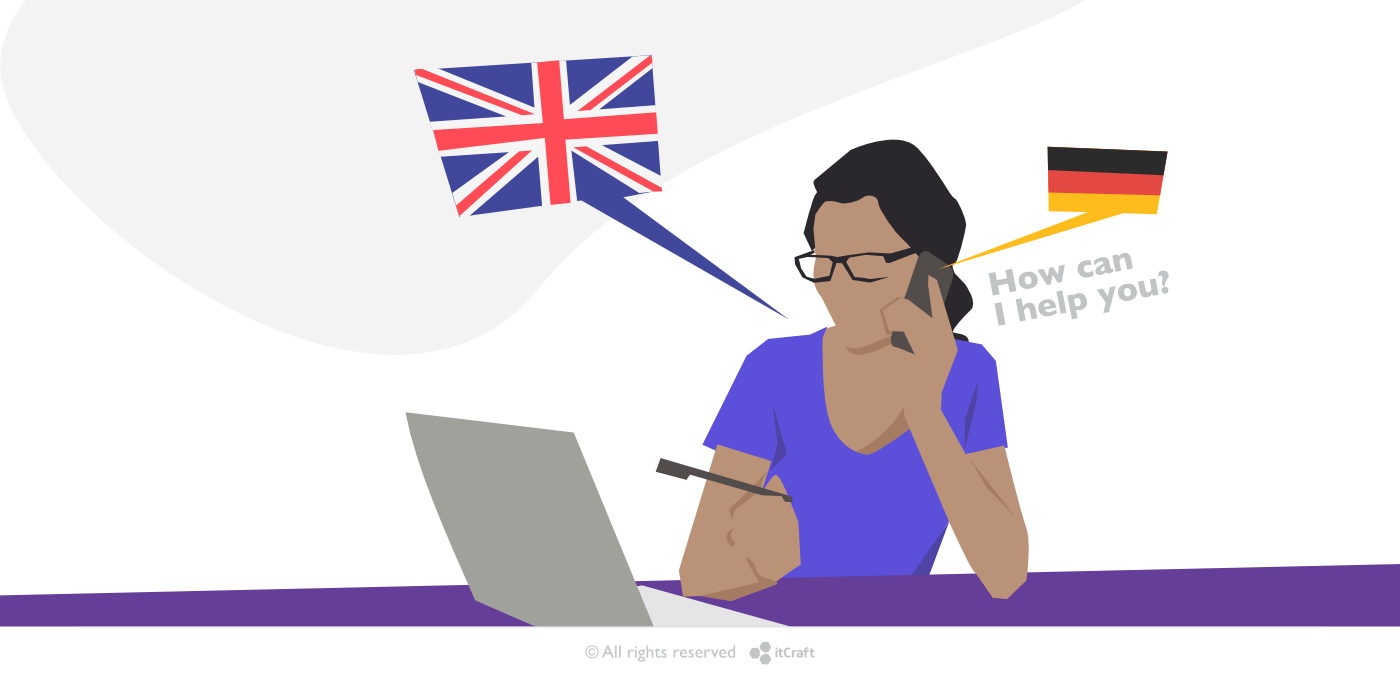Does the language barrier exist in Germany? 7 things you need know before entering the German market.

Michał Bryła

Companies from all over the world enter the German market with their products or services. After all, it is the largest EU economy, with great potential. From the perspective of a software house from Poland targeting the market, I wondered if the language barrier makes it difficult to establish business contacts. The courtesy of over 70 people with whom I spoke via LinkedIn, the following transpires.
Doing Business in Germany – 7 things to better understand German market
1. B2B/B2C
I will focus mainly on B2B relations. When talking B2C, I believe you need a good command of German, as you’d be dealing with consumers directly. Native language customer support is also a must.
Both in private and business relations, it’s always easier to speak your mother tongue. It’s more natural and comfortable than any other language. I asked my interlocutors about their opinion on the language preferences in German companies. Are they open to using English nowadays?
The shortest answer to the above question I had heard: “it depends”.

2. Size of the company
Size is an important factor to analyze, as it plays a vital role in the approach to using English. In this case, the size really matters. Let’s start with Start-ups.
Start-ups
The majority of German Startups rely on English more than German, as they’re often made up of people from all parts of the world. Another reason for it is that they are working internationally and often the market and investors work towards international expansion.
Most startups tend to recruit employees from non-DACH countries, so English is a pragmatic choice for communication.
SMEs (small and medium sized enterprises)
Among the SMEs, it largely depends on the target markets. In export, trading companies’ employees in sales, export, management etc. will be able to communicate more or less freely in English. In the case of IT companies, a vast majority of employees are able to speak English, as there are insufficient resources to build German-only-speaking teams.
The more local the company, the lesser the use of English. However, this trend is changing, as companies shift their focus to the international markets, additionally to doing business locally. Even for companies working only in Germany, English is essential to ensure better understanding, as often foreign partners are a party in the communication.
Large, well-established companies
If a company focuses mainly on the local market, their preferred language is still German and you might have some difficulty doing business in English.
A completely different situation occurs when the company operates worldwide. Then English is common, used in internal and external communication, at business meetings, and considered a standard. English is a part of daily business and not a barrier at all in companies’ German headquarters.

3. Location
Doing business in Germany, language can be an issue. It depends on where you are in Germany. Berlin, owing to its huge diversity and presence of international business, has widely adopted English. It’s also a place full of start-ups, so Berliners use English on a daily basis.
What’s quite intriguing, those visiting Berlin complain that they can’t practice their German as many citizens can effortlessly switch to English.
The rest of the country is a bit different. If you go south, English could be a barrier in communication as native German is preferred, although there are also a lot of English-speaking Germans in big cities like in Hamburg, Bonn, Stuttgart and Munich. In this case, a universal rule applies: the larger the city, the more people are eager to speak other languages.
In my blogpost: “How does the German market evaluate polish mobile app development companies?” I mentioned that Germans have a good opinion about developers from over the eastern border. My interlocutors said that good command of English as well as cultural and ethnical similarities are great foundations to building fruitful relations.
4. Role in the company
The willingness to use English also depends on a position held in a company. For the management there will be absolutely no barrier as this is their standard language of communication due to eg. often having foreigners among colleagues. Also for people in sales, project managers etc. the use of English isn’t an issue.
On the other hand, for people working on lower levels it might be a barrier, as they prefer German or at least German and English.
When trying to enter German market, during business negotiations, you usually contact C-Level executives first, but remember when you reach a cooperation agreement, you might work with employees who do not necessarily want to communicate in a language other than their native.
5. German business culture and habits
It’s important to look at language as a part of the culture and to adapt to German needs and habits.
Depending on your company or product, this can range from understanding German holidays, the way Germans use certain products, having a native language customer support or simply – and this goes back to language – understand what Germans believe is English. Terms like “Handy” or “Beamer” are very common but don’t refer to BMWs or a skill.
6. Getting trust
Long-term businesses are based on relations. As it seems quite easy to enter the German market, it’s more difficult to build long-lasting relationships.
Even in companies where English is the official company language, as one of my interlocutors noticed – it is really appreciated when he speaks German. It’s always valuable to be able to express yourself idiomatically.
Owing to that you show the respect that you’re trying to integrate yourself with the culture of your future business partners. Although hard, your efforts will be appreciated. At least you can distinguish yourself from the rest that relies only on English.
7. Education
According to the report “Key Data on Teaching Languages at School in Europe,” by the European Commission, children start learning English at the age of 10. This obligation lasts until the age of 19. Nowadays most children in Germany begin learning at the age of 8.
Another factor – higher education – correlates positively with better knowledge of the English language. These are great foundations for English to become even more common in the future.

Summary
When entering the German market, you must definitely pay attention to who your target group is. If your product or service is for a B2C client, it is definitely worth using the native language of your customers. If your domain is B2B, you should take into account the size of the companies, as it is one of the factors affecting communication. When doing business in Germany, pay attention to the role of the person you are trying to reach. The higher the position, the higher the probability of their familiarity with English. Keep in mind that after establishing cooperation, the German language may still be required as it makes the daily business and communication in the team much easier. Current education indicates that the trend is positive and over time more and more people will be able to use English, not just for business communication.
Nevertheless, using German, you show respect to your business partners and thus increase the chance to gain trust, which can help you achieve success. It is valuable knowledge learnt from people knowing the German market inside out. As a company, we implement this valuable advice in our strategy. We are aware that due to the shortage of IT specialists in Germany, there are possibilities for polish development companies specialized in software outsourcing. I hope that the above tips will be helpful not only for us.






